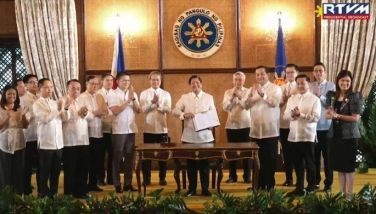RCEP a boost to intellectual property – IPOPHL
MANILA, Philippines — With the Regional Comprehensive Economic Partnership (RCEP) recently coming into force in the country, the Intellectual Property Office of the Philippines (IPOPHL) hopes to use provisions on intellectual property (IP) to its advantage.
In a statement yesterday, IPOPHL director general Rowel Barba said they look forward to a regional value chain of innovation and creativity built firmly on transparency, efficiency and cooperation, emphasizing that the RCEP features provisions related to IP.
“Chapter 11 or the IP chapter of RCEP, which was negotiated by IPOPHL affirms the imperative to reduce impediments to trade and investment through the effective and adequate creation, utilization, protection and enforcement of IP rights,” Barba said.
He explained that the IP chapter of the RCEP recognizes members’ different levels of economic development and capacity; differences in national legal systems; and the need to maintain an appropriate balance between rights of IP right holders and the legitimate interests of users and the public interest; and a transparent IP system that helps provide confidence to right holders, among others.
“Filipino IP owners and rights holders doing business in any of the RCEP member-countries could be assured of more harmonized and predictable rules and practices as RCEP members commit to ratify and accede to key international agreements on IP. This ensures the protection of the IP rights of Filipinos outside of the Philippines, particularly in countries signatory to RCEP,” Barba said.
Barba emphasized that even before the RCEP’s entry into force in the Philippines earlier this month, IPOPHL has been preparing and already improving its services.
“Aside from completing accession and ratification of key international treaties on IP, we have streamlined our procedures, provided reliable e-services in IP administration, built a transparent IP system and continue to strengthen IP enforcement both in the physical markets and in the digital environment,” Barba said.
Moving forward, the agency hopes to use various provisions to its advantage, such as the Genetic Resources, Traditional Knowledge, and Folklore (Article 11.53), which is a unique feature for a free trade agreement, according to Barba.
“With the rich indigenous, cultural, and environmental resources the Philippines is blessed with, the protection of genetic resources, traditional knowledge, and folklore has been an offensive interest for the Philippines even at the very start of the negotiations,”Barba said.
“It is crucial for us that there is recognition of the need to protect and adequately safeguard the community intellectual rights of our indigenous and cultural communities, as well as their ownership over products sacred to their culture and communal identity,”he said.
Moreover, as the RCEP also puts emphasis on cooperation, Barba said IPOPHL will step up to the plate and will come to its new partners’ aid in complying with their commitments as well as finding the best protection and enforcement measures appropriate for their innovative and economic needs.
“We will impart our best practices and help transform the region into a model for using IP judiciously and flexibly while cognizant of the rules-based trading system,” Barba said.
Signed in November 2020 by the Association of Southeast Asian Nations including the Philippines together with their trade partners China, Japan, South Korea, Australia and New Zealand, RCEP accounts for 30 percent of the world’s population, trade and gross domestic product.
It covers trade in goods, services, investments, economic and technical cooperation as well as dispute settlement, among others.
The ratification of the agreement was approved by the Senate earlier this year.
With the issuance of Executive Order (EO) No. 25 s. 2023, the Philippines’ tariff commitments under the RCEP are set to be implemented.
“As RCEP takes effect, we commit to supporting Philippine businesses in becoming more productive and competitive within the region and globally. RCEP is a mega free trade deal that will also facilitate the influx of more investments in the country,” Trade Secretary Alfredo Pascual said earlier.
Pascual said the RCEP provides a framework of rules and disciplines to guarantee regulatory coherence, foster an environment that is essential for preserving the confidence of the business community and investors, and boost economic growth.
“Let us view RCEP as a supplementary tool to our efforts in attracting more inward investments to spur economic growth, and sustainability,” Pascual said.
- Latest
- Trending






























